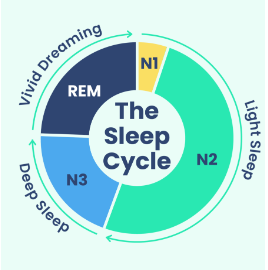Dreams: A Complex and Mysterious Phenomenon
Have you ever suddenly woken up from sleep, reminiscing on a dream you just had that felt completely unreal?
Dreams have a fantastical quality to them—something you can touch but never fully grasp or understand. Sometimes it’s even difficult to distinguish them from reality, as they feel so tangible when you experience them. But as soon as you wake up, they fade away, often erasing themselves from our memory. However, it is our memories themselves that play such a key role in why we dream.
 Most dreams we have at night are unique to the rapid eye movement (REM) stage of sleep. Although dreams seem imaginative and unreal, they draw on very real elements of our lives. Events, people, places, or things that appear in your dreams have likely appeared or occurred in your life. Something that you’ve experienced recently in life would commonly appear in your dream about five to seven days after it occurs, which is labeled as the “dream-lag effect.” This effect captures important and more personally significant occurrences (most often associated with emotional feelings) and consolidates them in REM sleep periods.
Most dreams we have at night are unique to the rapid eye movement (REM) stage of sleep. Although dreams seem imaginative and unreal, they draw on very real elements of our lives. Events, people, places, or things that appear in your dreams have likely appeared or occurred in your life. Something that you’ve experienced recently in life would commonly appear in your dream about five to seven days after it occurs, which is labeled as the “dream-lag effect.” This effect captures important and more personally significant occurrences (most often associated with emotional feelings) and consolidates them in REM sleep periods.
The peer-reviewed scientific journal Neurobiology of Learning and Memory published a study in which multiple volunteers kept a log of daily events, concerns, and personal occurrences that they experienced throughout each day. The “personally significant events” appeared to pop up most often in dreams about five to seven days after they happened. This dream-lag also only showed up in the dreams of participants at home during REM sleep. REM sleep integrates and strengthens memories and connections within our brains.
 Dreams don’t solely draw on recent memories but rather combine them with events that happened months or years ago in a complex pattern of memory associations. For example, if you ate a slice of pie in your last dream, you may have eaten pie a few days before. That memory, however, is also linked to previous moments in your life when you may have eaten pie. It could be related to a memory of eating pie on Thanksgiving with your family or bonding with a friend over a cherry pie. Everything is constantly being connected and networked in your brain, even more so at night than during the day.
Dreams don’t solely draw on recent memories but rather combine them with events that happened months or years ago in a complex pattern of memory associations. For example, if you ate a slice of pie in your last dream, you may have eaten pie a few days before. That memory, however, is also linked to previous moments in your life when you may have eaten pie. It could be related to a memory of eating pie on Thanksgiving with your family or bonding with a friend over a cherry pie. Everything is constantly being connected and networked in your brain, even more so at night than during the day.
Even as studies and research continue to reveal more information about why and how dreams work, there is still so much we don’t know. For now, dreams will continue to amaze and surprise us, one night at a time.
Sources:

Annia is a senior at Keystone School and an active writer and Editor-in-Chief of the Keynote, as well as the Co-president of the World Language Club....

